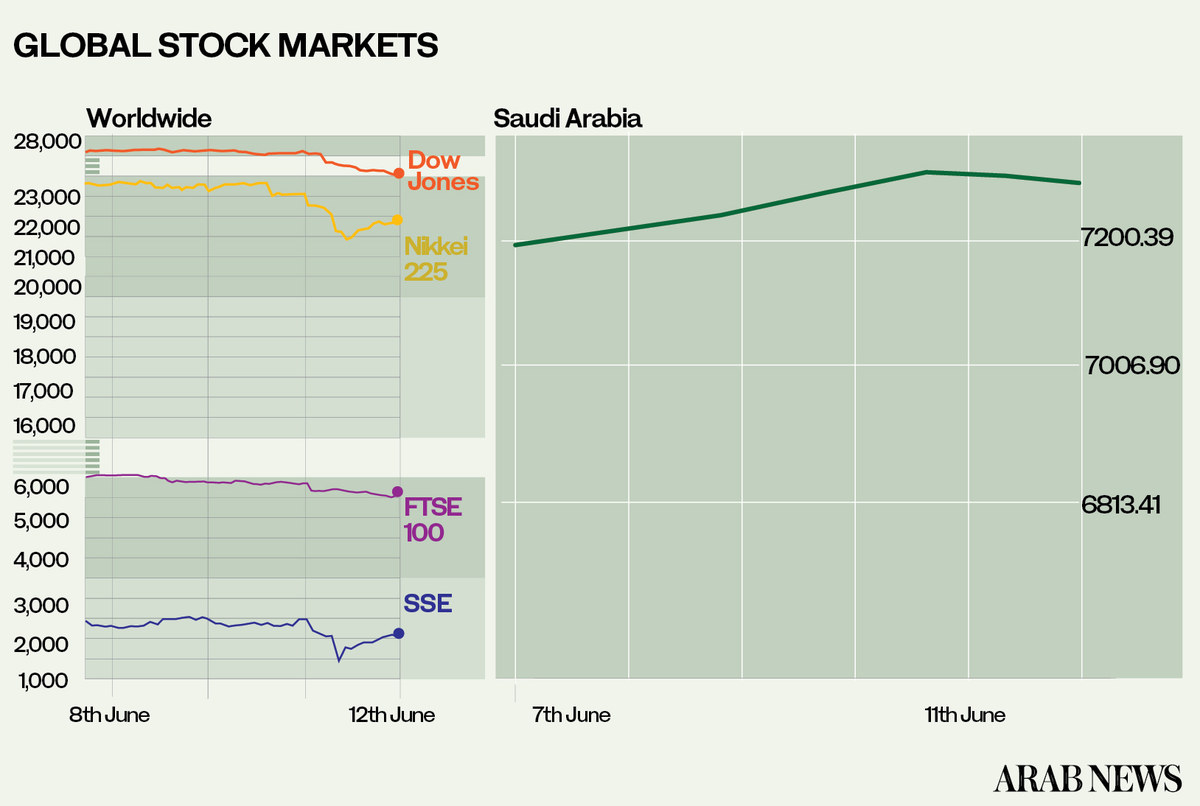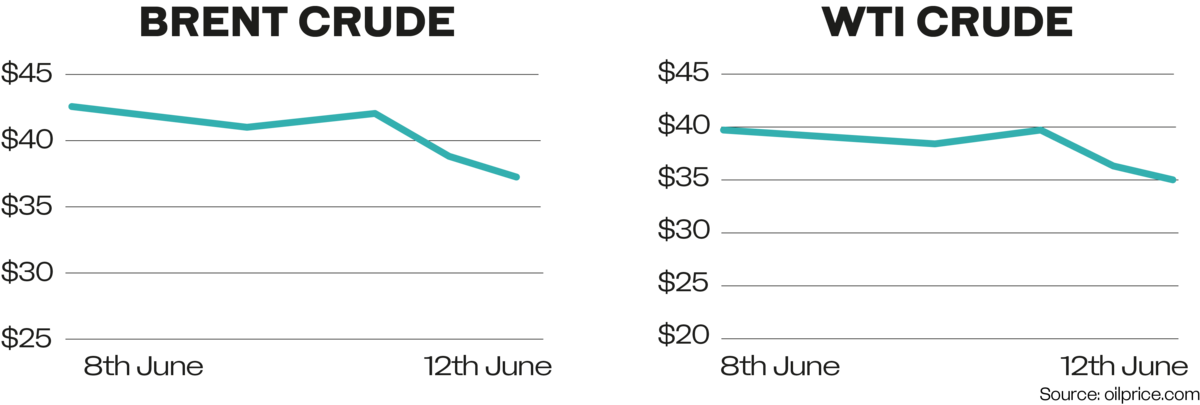What happened:
Global stock markets ended their rally. Mid-week, the Nasdaq briefly broke the 10,000, while the S&P 500 reached pre-pandemic levels. Afterwards, market contractions saw their worst since March on fears of a second wave of the pandemic and a pessimistic outlook for the US economy by Chair of the Federal Reserve Jerome Powell — views that were echoed by the grim forecasts of the Organisation for Economic Co-operation and Development (OECD) countries. Sentiments turned risk-off, wiping off $2 trillion in US equities on Thursday.

First quarter non-bank business debt in the US jumped the most since 1952 to $16.8 trillion on the issuance of bonds and loans.
Initial jobless claims for the week ending June 5 came in at 1.54 million. Worldwide hiring rates may have stabilized, but they are still at depressed levels.

OPEC+ extended its 9.7 million barrels-per-day (bpd) cuts for another month. Afterwards, the 23 countries will the reduce production by 7.7 million bpd through 2020 and by 5.8 million bpd through April 30, 2021. KSA, the UAE and Kuwait are ending their voluntary additional cuts of 1.2 million at the end of June. Saudi Arabia and Russia cracked down on non-compliance with laggards, which exceeded 1 million bpd. Performance will be monitored monthly. Oil initially rallied on the news, but had its worst week since April, reflecting the general risk-off sentiments in markets.

British Airways, Ryanair and EasyJet are suing the UK over the two-week quarantine rule for incoming passengers.
Mubadala Investment Co., which has $232 billion in assets, reported 2019 total comprehensive income at $53 billion, up more than 4 times from 2018. Deputy Chief Financial Officer Saeed Al-Mazrouei said that the fund was poised to invest overseas, benefitting from attractive valuations.
According to The Financial Times, KSA is considering cancelling Hajj due to the coronavirus disease (COVID-19) pandemic for the first time since the founding of the Saudi Kingdom in 1932. Revenues from the Hajj and Umrah pilgrimages were expected to contribute in excess of $12 billion to the Saudi economy in 2020.
Background:
As economies started to open, global COVID-19 cases surpassed the 7.5 million mark, which sparked fears about a second wave.
Houston is reportedly considering re-imposing a second lockdown after a dramatic resurgence of cases. Meanwhile, US Secretary of Treasury Steven Mnuchin went on record against shutting the economy again.
Both the OECD and the Federal Reserve voiced fears about a second wave. The OECD’s economic outlook forecasted global economic activity to fall by 6 percent in 2020 and OECD unemployment to rise to 9.2 percent. In case of a second outbreak, the global economy would shrink by 7.6 percent this year, before climbing back 2.8 percent in 2021. The average unemployment rate in OECD countries would rise to 10 percent in that case.
Federal Reserve officials predict the US economy to contract by 6.5 percent and recover by growing 5 percent in 2021 and 3.5 percent in 2022. They predict unemployment to come down to 9.3 percent by the end of the year.
Powell fears that the pandemic will leave permanent scars in the economy. He is also concerned about the poorer segments of society, as well as African Americans and Hispanics, being disproportionately affected. Powell predicts the shape of the recovery to come in the form of a U rather than a V. Inflation is forecast at 1.7 percent, which is below target.
The Federal Reserve will leave rates unchanged close to zero for the foreseeable future, or at least until the end of 2022. It is continuing its asset purchasing program, et altera buying around $20 billion in Treasury purchases per week.
Negative interest rates still seem to not be considered among policy options. However, the Federal Open Market Committee is said to have discussed explicit forward guidance of interest rates and yield curve control by targeting specific interest rates depending on the duration of the debt. The latter was reportedly still an “open question.”
Powell is keeping his eyes firmly focused on the real economy, providing liquidity to the system, inflation and employment. He is less concerned about asset bubbles.

Where we go from here:
The UK government announced that it would temporarily adopt a light-touch regime of checking EU imports both in case of a deal or no-deal Brexit. This is a reflection of the Brexit negotiations not having made enough progress to reach an agreement by the end of June and the fact that the UK economy is reeling from the impact of the COVID-19 crisis (GDP contracted by 20 percent in April).
On the other side of the channel, the EU is concerned by certain economies (like Ireland or Belgium) being hard hit by a potential no-deal Brexit.
— Cornelia Meyer is a Ph.D.-level economist with 30 years of experience in investment banking and industry. She is chairperson and CEO of business consultancy Meyer Resources.
Twitter: @MeyerResources






















